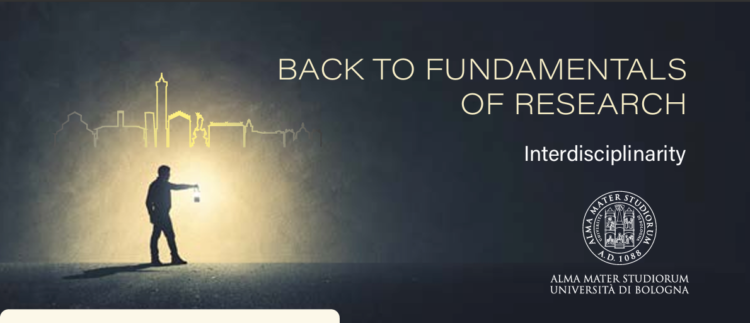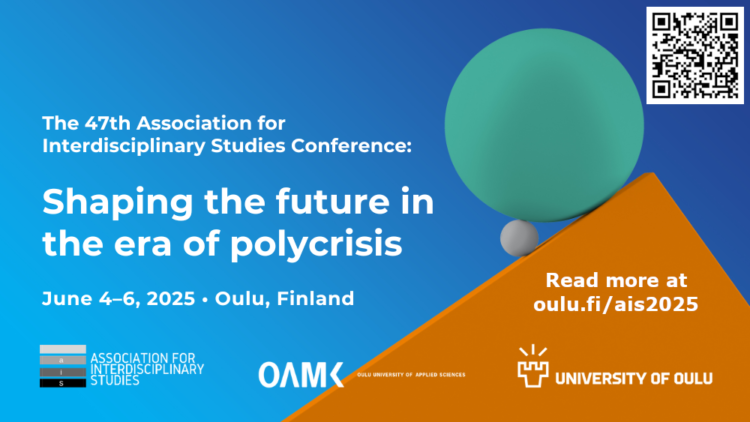SHAPE-ID member Prof Catherine Lyall was a keynote speaker at the University of Bologna's international…
Transdisciplinary Dialogues: Research Partnerships for Impact
Thursday 18th March 13.00 – 14.15 CET | 12.00 – 13.15 GMT
Partnerships with actors in civil society, industry, the cultural sector and citizens, are increasingly important to develop societally relevant research. In recent years our understanding of these relationships has evolved from a more limited idea of ‘end users’ to that of ‘co-creators’ of research, necessitating the development of transdisciplinary dialogues. This final webinar in the SHAPE-ID series invited experts engaged in transdisciplinary work bridging research and society to discuss the importance, benefits and challenges of building transdisciplinary partnerships and co-creation, with examples from their own sectors and projects.
Invited panellists Prof. dr Caroline Nevejan (Chief Science Officer of the City of Amsterdam), Fionn Kidney (Human Insights Lab, Accenture) and Dr Giulia Sonetti (Politecnico di Torino) presented perspectives from their own experience engaging in transdisciplinary research across sectors, followed by an interactive Q&A with the audience chaired by Professor Jane Ohlmeyer (Trinity College Dublin), Principal Investigator of the SHAPE-ID project and Chair of the Irish Research Council. We were pleased to be joined by Caroline’s colleague Thijs van Schijndel for the Q&A.
Full details of the panellists and presentations are below. You can watch the recorded webinar on our Facebook page or listen back to the audio recording here:
Panellists
 Prof dr. Caroline Nevejan | University of Amsterdam & Chief Science Officer of the City of Amsterdam
Prof dr. Caroline Nevejan | University of Amsterdam & Chief Science Officer of the City of Amsterdam
City Science: openresearch.amsterdam
Prof. dr. Caroline Nevejan is a researcher and designer who has been involved with the emerging network society and digital culture since the 1980’s. Nevejan is a regular presenter at national and international fora. She is an advisor to national and European policy makers.
Caroline Nevejan is professor by special appointment with the Amsterdam School for Social Science Research, University of Amsterdam (2018-2023). Her research is focused on Designing Urban Experience and she supervises 5 PhD candidates in this context.
As of 20th of March 2017 Caroline Nevejan has been appointed Chief Science Officer of the city of Amsterdam. The Chief Science Officer orchestrates research between the municipality of Amsterdam and the different scientific, academic and artistic universities in the city. With a small team she makes sure that civil servants and researchers can find each other and invent different new ways of working together.
 Fionn Kidney | Human Insights Lab, The Dock, Accenture
Fionn Kidney | Human Insights Lab, The Dock, Accenture
Integrating Societal Perspectives in Industry
Academic, artist, CEO or consultant – we are all part of a wider system facing unprecedented and complex challenges that must be addressed if people and society are to thrive. In this talk, Fionn will highlight key shifts in how industry understands its role in solving these challenges, and propose that we will need to build a deeper level of understanding and connection with both people and society to do so. To illustrate this, he will share his experience and learnings on the integration of the social sciences, arts and humanities in business, and of bridging industry, academia and the cultural sectors.
Fionn Kidney has spent the past two years building an interdisciplinary team that introduces the social sciences, arts and humanities into innovation conversations at The Dock, Accenture’s global R&D and innovation centre. Prior to joining The Dock in 2017, Fionn spent five years with Science Gallery, first at Trinity College Dublin, and later working to establish a network of several new university-linked galleries worldwide. His early career spans creative agencies, digital media, creative production and consulting on a diverse range of cultural and commercial projects. He is the founder of the biennial island festival Turkfest, sits on the board of interdisciplinary and award-winning company Anu Productions, and has served on the boards of both GAZE Film Festival and Darklight Film Festival.

Dr Giulia Sonetti | Politecnico di Torino
The same old story – or not? How storytelling can be a tool for inter/transdisciplinary practice
Methods designed for multi-stakeholder engagement often do not sufficiently open up deliberative processes to all voices, and efforts to envision desired futures built are usually designed by and oriented towards specialists. With this presentation, we will show how the theoretical strengths of storytelling play out in practice when facing the typical inter/transdisciplinary barriers, and opportunities. We present lessons learnt from actually using storytelling in a set of 17 multi-stakeholder workshops across 17 European countries run as part of the H2020 SHAPE ENERGY project. The workshops were each designed around a tangible local energy policy challenge. We found storytelling has unique strengths in terms of enabling significant (un)learning regarding stakeholder relationships, allowing participants to step into others’ perspectives, keeping hold of diversity, and the use of ‘we’ in stories leading to concrete future initiatives. We also note specific learnings about when these outcomes may not be achieved, for example due to fears, traditions, hierarchical structures, as well as the need for sufficient time for planning, facilitator training and stakeholder invitations.
Giulia Sonetti, PhD, MSc, MArch+BArch, is assistant professor at Politecnico di Torino, Sustainability Specialist at Green Team (Turin), Transdisciplinary Researcher at CENSE (Center for Environmental and Sustainability Research (Lisbon), and fellow at the Postdoc Academy for Transformational Leadership (Robert Bosch Stiftung foundation, Berlin). While being organiser, speaker and facilitator of several shared-science and multi-stakeholder workshops around Europe, she designed and implemented many national, EU FP7 / H2020 research projects about inter/trans-disciplinary approaches, university campus sustainability management strategies, organisational change, and transformative education methods. Currently, she is manager and principal investigator at the research project “TrUST – Transdisciplinarity for Urban Sustainability Transition”.



